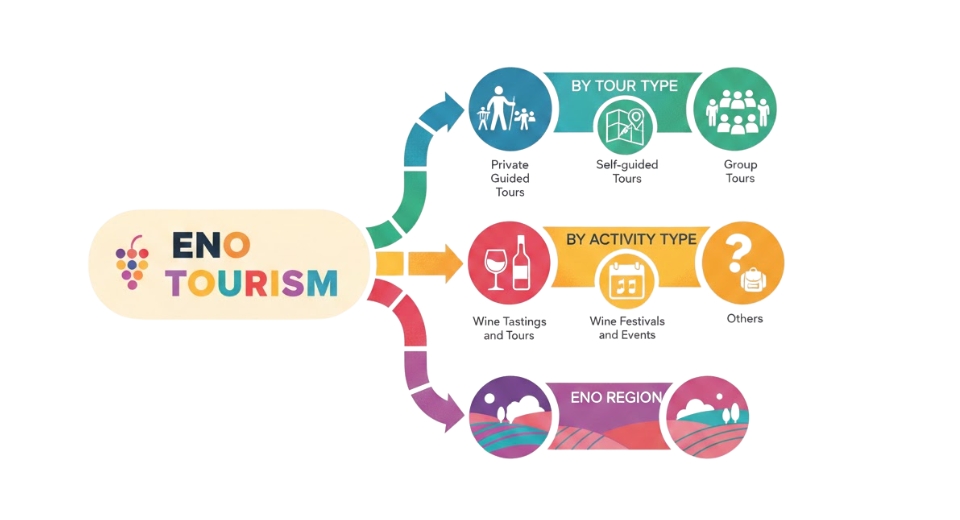
Nov 21, 2025

According to the most recent global enotourism market report released by Metastat Insight, vineyard-centered tourism is a part of the overall trend of cultural immersion, where local heritage, traditions, and sensory experiences create unforgettable trips. Travelers are being attracted to the places that tell the most about the different vineyards, cellars, and terroirs and the stories behind them, thanks to the growing demand for real encounters with the culture. Gradually the focus has moved away from simple sightseeing to experiences that are closely related to the place, the community, and the understanding of the production origins. Wineless travel has gained importance across both mature and upcoming destinations by the rising popularity of local food systems, sustainable land usage, and artisanship.
Market Context
The changing expectations of travelers have made a strong case for culinary and agricultural experiences that are integrated directly into the destination’s identity. Visitors no longer want to just sample the food they want a full experience along with the landscape, the producers, and the methods behind the regional specialties. There is a new way of engaging the senses through winery tours, cellar visits, participation in harvests, and tasting classes that goes beyond just sightseeing. Operators in established wine regions are upgrading their programs for visitors, while countries that are new to wine are gaining visibility through the organization of tours, training centers, and heritage interpretation. As the competition among the destinations increases, the differentiation is increasingly depending on the stories, the ambiance, and the land stewardship practices. The specialized travel agencies, the boutique accommodation providers, and the regional associations have started to cooperate more closely to align their branding, make visitor access easier, and improve seasonal programming.
How It Works / Why It’s Valuable
Enotourism is a form of tourism that not only permits but encourages interaction with the places where wine is produced, the landscapes of viticulture, and the cultural stories told through the wine. The main elements of these offerings are vineyard mapping, guided tasting sequences, food pairings, cellar demonstrations, and sensory education modules. Through a process of engagement the visitors will come to appreciate more deeply the aspects of biodiversity, terroir difference, and artisanal practice. The participating places feel that there is a lot of potential in the organized visitor movements, the use of interpretative signs, and the creation of hospitality settings which are able to support the visitors’ memorable engagement. Wine producers gain from a loyal customer base, they can charge more for the products sold through the direct-to-visitor channels, and they are allowed to share the old traditional ways of making wine. Travel agents see enotourism as a multipurpose segment linking agriculture, heritage, gastronomy, outdoor recreation, and wellness. The sectors have worked together to make the experiences of the visitors more attractive and to make the visitors' navigation more smooth, the service level higher, and the environmental management better.
Growth Story / Technological Evolution
Enotourism is a form of tourism that not only permits but encourages interaction with the places where wine is produced, the landscapes of viticulture, and the cultural stories told through the wine. The main elements of these offerings are vineyard mapping, guided tasting sequences, food pairings, cellar demonstrations, and sensory education modules. Through a process of engagement the visitors will come to appreciate more deeply the aspects of biodiversity, terroir difference, and artisanal practice. The participating places feel that there is a lot of potential in the organized visitor movements, the use of interpretative signs, and the creation of hospitality settings which are able to support the visitors’ memorable engagement. Wine producers gain from a loyal customer base, they can charge more for the products sold through the direct-to-visitor channels, and they are allowed to share the old traditional ways of making wine. Travel agents see enotourism as a multipurpose segment linking agriculture, heritage, gastronomy, outdoor recreation, and wellness. The sectors have worked together to make the experiences of the visitors more attractive and to make the visitors' navigation more smooth, the service level higher, and the environmental management better.
Regional or Global Trends
Adoption has expanded rapidly across countries with deep wine heritage, where established production zones already attract visitors drawn by reputation and scenic appeal. Long-standing vineyard routes continue to attract global attention, supported by strong branding, consistent quality standards, and comprehensive visitor networks. Meanwhile, newer wine-producing regions are gaining recognition through storytelling, boutique labels, and distinctive local grape varieties. Many emerging markets are using enotourism as a development tool to elevate agricultural communities, generate rural employment, and broaden international awareness. Cross-border cooperation programs, shared routes, and thematic trails have further increased global visibility.
Challenges and Opportunities
Resource management, infrastructure gaps, regulatory complexity, fragmented marketing, and seasonal limitations present ongoing hurdles for operators and destination authorities. Some regions face pressure to protect landscapes from overuse, requiring coordinated stewardship, careful visitor distribution, and responsible land-use planning. Training gaps can also limit service consistency across small producers or remote areas. Despite these constraints, opportunities remain abundant. Improved digital platforms support reservation efficiency, storytelling, and personalization. Enhanced transportation links increase accessibility for domestic and international travelers. Collaboration with culinary schools, conservation groups, and hospitality academies fosters innovative programming. Broader demand for sustainable travel aligns strongly with vineyard-based experiences rooted in heritage, craft, and ecological respect.
Why It Matters Now
An updated outlook on the global enotourism market from Metastat Insight underscores growing alignment between agricultural appreciation, cultural preservation, and responsible exploration. Expanding interest in locally grounded experiences reflects broader movements toward wellness, environmental awareness, and meaningful engagement with community traditions. Vineyard tourism offers a lens into land stewardship, artisanal practice, and regional identity, supporting rural economies while enriching global travel culture. Continued evolution promises deeper ties between conservation, gastronomy, and experiential learning, guiding destination development in a direction shaped by authenticity, creativity, and long-term sustainability.
Drop us an email at:
Call us on:
+1 214 613 5758
+91 73850 57479